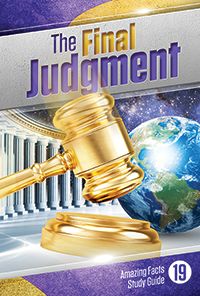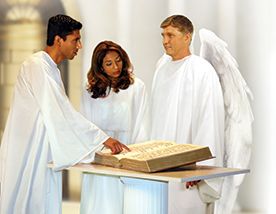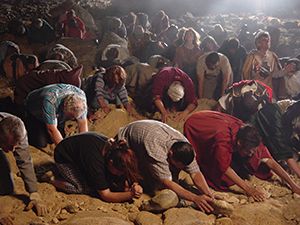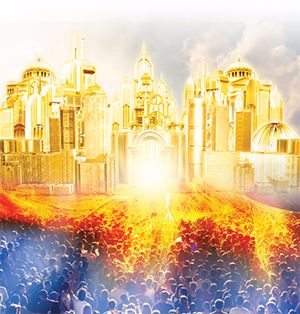The Final Judgment
Lesson 19

The jury is in, the verdict read—case closed! Few thoughts could be more sobering. The day is fast approaching when all who have ever lived will have their lives reviewed before the all-knowing God (2 Corinthians 5:10). But don’t let this alarm you—take heart! Millions have already found the judgment message revealed in this Study Guide to be very good news! On four occasions when the book of Revelation mentions the great judgment, it brings forth praise and thanksgiving! But did you know that the Bible mentions judgment more than a thousand times? Almost every Bible writer refers to it, so its importance cannot be overstated. In the next few minutes, you’re going to get a real eye-opener on this neglected subject. Note: There are three phases of the final judgment—watch for them as you study this lesson!
First Phase of the Final Judgement
1. The angel Gabriel gave Daniel the prophecy of the 1844 heavenly judgment. The first phase of the judgment has been called the “pre-advent judgment” because it takes place before Jesus’ second coming. What group of people will be considered in the first phase of the judgment? When does it end?
“The time has come for judgment to begin at the house of God” (1 Peter 4:17).
“He who is unjust, let him be unjust still; he who is filthy, let him be filthy still; he who is righteous, let him be righteous still; he who is holy, let him be holy still. And behold, I am coming quickly, and My reward is with Me, to give to every one according to his work” (Revelation 22:11, 12).
Answer: It ends just before the second coming of Jesus. (The beginning date of 1844 is established in Study Guide 18.) Alive or dead, those who claimed to be Christians (“the house of God”) will be considered in the pre-advent judgment.
2. Who presides at the judgment? Who is the defense attorney? The judge? The accuser? Who is the witness?
“The Ancient of Days was seated. … His throne was a fiery flame. … The court [judgment] was seated, and the books were opened” (Daniel 7:9, 10).
“We have an Advocate with the Father, Jesus Christ the righteous” (1 John 2:1).
“The Father … has committed all judgment to the Son” (John 5:22).
“The Devil … the accuser of our brethren, who accused them before our God day and night, has been cast down” (Revelation 12:9, 10).
“These things says the Amen, the Faithful and True Witness, the Beginning of the creation of God” (Revelation 3:14).
(See also Colossians 1:12–15.)

Answer: God the Father, the Ancient of Days, presides in the judgment. He loves you very much (John 16:27). Satan is your only accuser. In the heavenly court, Jesus, who loves you—and is your best friend—will be your attorney, judge, and witness. And He promises that judgment will be “made in favor of the saints” (Daniel 7:22).
3. What is the source of evidence used in the pre-advent judgment? By what standard will all be judged? Since God already knows everything about every person, why have a judgment?
“The court [judgment] was seated, and the books were opened” (Daniel 7:10). “The dead were judged according to their works, by the things which were written in the books” (Revelation 20:12). “[They] … will be judged by the law of liberty” (James 2:12). “We have been made a spectacle [theater] to the world, both to angels and to men” (1 Corinthians 4:9).

Answer: Evidence for this court comes from “books” in which all the details of one’s life are recorded. For the faithful, the record of prayer, repentance, and forgiveness of sin will be there for all to see. The records will prove that God’s power enables Christians to live changed lives. God is pleased with His saints and will delight in sharing the evidence of their lives. The judgment will confirm that there is “no condemnation to those who are in Christ Jesus, who do not walk according to the flesh, but according to the Spirit” (Romans 8:1). The Ten Commandment law is God’s standard in the judgment (James 2:10–12). Breaking His law is sin (1 John 3:4). The righteousness of the law will be fulfilled by Jesus in all of His people (Romans 8:3, 4). To claim that this is impossible is to doubt Jesus’ word and His power. The judgment is not to inform God. He is already fully informed (2 Timothy 2:19). Rather, the redeemed will be coming to heaven from a world that has been degraded by sin. Both the angels and the inhabitants of unfallen worlds would certainly feel uneasy about admitting anyone to God’s kingdom who might start sin all over again. Thus, the judgment will open to them every detail and answer every question. Satan’s real aim has always been to discredit God as unfair, ruthless, unloving, and untruthful. This makes it even more important for all beings in the universe to see firsthand how extremely patient God has been with sinners. The vindication of God’s character is another very important purpose of the judgment (Revelation 11:16–19; 15:2–4; 16:5, 7; 19:1, 2; Daniel 4:36, 37). Note that the praise and glory are given to God for the way He handles the judgment.
4. What portion of a person’s life is considered in the pre-advent judgment? What will be confirmed? How will rewards be decided?

“God will bring every work into judgment, including every secret thing, whether good or evil” (Ecclesiastes 12:14).
“Let both [wheat and tares] grow together until the harvest. … The Son of Man will send out His angels, and they will gather out of His kingdom all things that offend” (Matthew 13:30, 41).
“Behold, I am coming quickly, and My reward is with Me, to give to every one according to his work” (Revelation 22:12).
Answer: Every detail of life will be reviewed, including secret thoughts and hidden actions. For this reason, this first phase of the judgment has been called the “investigative judgment.” The judgment will confirm who will be saved of those who claimed to be Christians. It will doubtless also confirm as lost those whose names are not judged in the pre-advent judgment. Although we are saved by grace, rewards will be given based on works, deeds, or conduct—which prove the genuineness of a Christian’s faith (James 2:26).
Second Phase of the Final Judgement
5. What group is involved in the heavenly judgment during the 1,000 years of Revelation chapter 20? What is the purpose of this second phase of the judgment?
“Do you not know that the saints will judge the world? … Do you not know that we shall judge angels?” (1 Corinthians 6:2, 3).
“I saw thrones, and they sat on them, and judgment was committed to them” (Revelation 20:4).
Answer: The “saints”—the saved people of all ages who Christ takes to heaven at His second coming—will be participating in this second phase of the judgment. Suppose a family discovered that their much-beloved son who was murdered is not in heaven—but the murderer is. Doubtless they would need some answers. This second phase of the judgment will answer all these questions. The life of every lost person (including Satan and his angels) will be reviewed by the saved, who will ultimately agree with Jesus’ decisions regarding the eternal fate for each one. It will become obvious to all that the judgment is no arbitrary matter. Instead, it simply confirms the choices that people have already made to serve either Jesus or another master (Revelation 22:11, 12). (For a review of the 1,000 years, see Study Guide 12.)

Third Phase of the Final Judgement
6. When and where will the third phase of the final judgment take place? What new group will be present at this phase of judgment?
“In that day His feet will stand on the Mount of Olives, which faces Jerusalem. … Thus the Lord my God will come, and all the saints with You. … All the land shall be turned into a plain from Geba to Rimmon south of Jerusalem” (Zechariah 14:4, 5, 10).
“I, John, saw the holy city, New Jerusalem, coming down out of heaven from God” (Revelation 21:2).
“When the thousand years have expired, Satan will … go out to deceive the nations … to gather them together to battle” (Revelation 20:7, 8).
Answer: The third phase of the judgment will take place on the earth at the close of the 1,000 years of Revelation chapter 20—after Jesus’ return to earth with the holy city. All the wicked who have ever lived, including the devil and his angels, will be present. At the close of the 1,000 years, the wicked dead of all ages will be raised (Revelation 20:5). Satan will launch a powerful propaganda campaign to deceive them. Amazingly, he will succeed in convincing the nations of earth that they can capture the holy city.

7. What happens next?

The wicked will try to attack the holy city.
“They went up on the breadth of the earth and surrounded the camp of the saints and the beloved city” (Revelation 20:9).
Answer: The wicked surround the city and prepare to attack.
8. What interrupts their battle plan, and with what results?
“I saw the dead, small and great, standing before God, and books were opened. And another book was opened, which is the Book of Life. And the dead were judged according to their works, by the things which were written in the books” (Revelation 20:12).
“We must all appear before the judgment seat of Christ” (2 Corinthians 5:10).
“As I live, says the Lord, every knee shall bow to Me, and every tongue shall confess to God. So then each of us shall give account of himself to God” (Romans 14:11, 12).
Answer: Suddenly, God appears above the city (Revelation 19:11–21). The moment of truth has arrived. Every lost soul since the world began, including Satan and his angels, now faces God in judgment. Every eye is fastened upon the King of kings (Revelation 20:12).
Each Life Reviewed
At this time, each lost soul recalls his or her own life story: God’s constant, warm, pleading calls to repent; that wooing, still small voice; the awesome conviction that often came; the repeated refusals to respond. It is all there. Its accuracy is incontestable. Its facts are irrefutable. God wants the wicked to fully understand. He will provide any details desired in order to make all things clear. The books and records are available.
No Cover-Up
God is not involved in some celestial cover-up. He has destroyed no evidence. There is nothing to hide. Everything is open, and every person who has ever lived and all the good and bad angels will be viewing this drama of all dramas.
The Lost Fall to Their Knees
Suddenly there is a movement. One lost soul drops to his knees to admit his guilt and openly confess that God was more than fair with him. His own stubborn pride kept him from responding. And on all sides now, people and evil angels are likewise kneeling (Philippians 2:10, 11). Then in one great, almost simultaneous move, all remaining people and evil angels, including Satan, fall prostrate before God (Romans 14:11). They openly clear the name of God from all false accusations and give witness to His loving, fair, merciful treatment of them.

All Confess the Sentence Is Fair
All confess that the sentence of death pronounced upon them is fair—the only safe way to handle sin. Of each lost person it can be said, “Thou hast destroyed thyself” (Hosea 13:9 KJV). God now stands vindicated before the universe. The accusations and claims of Satan have been exposed and discredited as the perverse lies of a hardened sinner.
9. What final steps will eradicate sin from the universe and provide a secure home and future for the righteous?
“They … surrounded the camp of the saints. … And fire came down from God out of heaven and devoured them. The devil, who deceived them, was cast into the lake of fire” (Revelation 20:9, 10).
“The wicked … shall be ashes under the soles of your feet” (Malachi 4:3).
“Behold, I create new heavens and a new earth” (Isaiah 65:17).
“We … look for new heavens and a new earth in which righteousness dwells” (2 Peter 3:13).
“Behold, the tabernacle of God is with men … and they shall be His people. God Himself will be with them” (Revelation 21:3).

Fire from heaven will eradicate sin and sinners for eternity.
Answer: Fire from heaven will fall upon the wicked. The fire will completely eradicate sin and those who cherish it from the universe forever. (See Study Guide 11 for full details on hellfire.) This will be a time of deep sadness and trauma for God’s people. Virtually every person will have a loved one or friend in the fire. Guardian angels will probably weep over the loss of the people they protected and loved for years. Christ will doubtless weep over those He loved and pled with so long. At that awful moment, the anguish of God—our loving Father—will defy description.
New Heavens and Earth
Then the Lord will wipe all tears away from His redeemed people (Revelation 21:4) and create new heavens and a new earth for His saints. And best of all, He will reside here with His people throughout eternity!

10. How did the Day of Atonement service of the Old Testament sanctuary symbolize the judgment and God’s plan to eradicate sin from the universe and restore harmony?

The sacrificed animal represented Jesus’ sacrifice on the cross.
Answer: In Study Guide 2, we learned that Satan falsely accused and challenged God, bringing the ugly malignancy of sin into the universe. The Day of Atonement in ancient Israel taught, through symbols, that God will handle the sin problem and bring harmony back to the universe through the atonement. (Atonement means “at-one-ment,” or “to bring all things into total divine harmony.”) In the earthly sanctuary, the symbolic steps were:
A. The Lord’s goat was slain to cover sins of the people.
B. The high priest ministered the blood before the mercy seat.
C. The judgment took place in this order:
(1) the righteous were confirmed, (2) the unrepentant were cut off, and (3)the record of sin was removed from the sanctuary.
D. The record of sin was then placed on the scapegoat.
E. The scapegoat was sent into the wilderness.
F. Sin was cleansed from the people and the sanctuary.
G. All began the new year with a clean slate.
These symbolic steps represent the literal atonement events that are instituted from the heavenly sanctuary—God’s celestial headquarters for the universe. The first point above is the symbol of the event of the first point below; the second point above is the symbol of the second point below, etc. Notice how clearly God has symbolized these great atonement events:
A. Jesus died a sacrificial death as mankind’s substitute (1 Corinthians 15:3; 5:7)
B. Jesus, as our High Priest, restores people to God’s image (Hebrews 4:14-16; Romans 8:29).
C. The judgment provides records to confirm lives—good and bad—and then removes the records of sin from the heavenly sanctuary (Revelation 20:12; Acts 3:19–21).
D. Satan bears ultimate responsibility for originating sin and for causing people to sin (1 John 3:8; Revelation 22:12).
E. Satan is banished into the “wilderness” (1,000 years of Revelation chapter 20).
F. Satan, sin, and those who cling to sin are eradicated (Revelation 20:10; 21:8;
Psalm 37:10, 20; Nahum 1:9).
G. A new earth is created for God’s people. All good things lost by sin are restored to the Lord’s saints (2 Peter 3:13; Acts 3:20, 21).
The atonement is not completed until the universe and all in it are restored to pre-sin condition—with the assurance that sin will never rise again.
11. What is the good news about the judgment as revealed in this Study Guide?
Answer: We have summarized the good news for you below …
A. God and His manner of handling the sin problem will be vindicated before the entire universe. This is the central purpose of the judgment (Revelation 19:2).
B. Judgment will be decided in favor of God’s people (Daniel 7:21, 22).
C. The righteous will be safe from sin for eternity (Revelation 22:3–5).
D. Sin will be eradicated and will never rise a second time (Nahum 1:9).
E. Everything Adam and Eve lost by sin will be restored to the redeemed (Revelation 21:3–5).

After the judgment, sin will be gone forever. The righteous will be safe for eternity.
F. The wicked will be turned to ashes—not tortured endlessly (Malachi 4:1).
G. In the judgment, Jesus is judge, attorney, and witness (John 5:22; 1 John 2:1; Revelation 3:14).
H. Both the Father and Son love us. It is the devil who accuses us (John 3:16; 17:23; 13:1; Revelation 12:10).
I. The heavenly books will be helpful to the righteous because they will show God’s leading in their deliverance (Daniel 12:1).
J. There is no condemnation to those who are in Christ. The judgment will make that truth evident (Romans 8:1).
K. Not one soul (man or angel) will complain that God is unfair. It will be unanimous that God has been loving, fair, gracious, and kind in dealing with all (Philippians 2:10, 11).
12. God promises to acquit you in the heavenly judgment if you invite Jesus to enter your life and permit Him to remain in control. Will you invite Him to enter today?

Answer:
Thought Questions
1. What is the difference between accepting Jesus as Savior and accepting Him as Lord?
The difference is significant. When you accept Him as Savior, He saves you from the guilt and penalty of sin and gives you the new birth. He changes you from sinner to saint. This transaction is a glorious miracle and is essential to salvation. No one can be saved without it. However, Jesus is not finished with you at this point. You have been born again, but His plan is that you also grow up to become like Him (Ephesians 4:13). When you accept Him daily as the ruler—Lord—of your life, He, by His miracles, causes you to grow in grace and Christian conduct until you are mature in Christ (2 Peter 3:18).
The Problem—Our Own Way
The problem is that we want to run our own lives and to have our own way. The Bible calls this “iniquity”—that is, sin (Isaiah 53:6). Making Jesus our Lord is so important that the New Testament mentions Him as “Lord” 766 times! In the book of Acts alone, He is referred to as “Lord” 110 times and as “Savior” only twice. This demonstrates how important it is to know Him as Lord and Ruler of our lives.
A Neglected Imperative—Making Him Lord
Jesus placed continuing emphasis upon His Lordship because He knew that crowning Him Lord would be a forgotten and neglected imperative (2 Corinthians 4:5). Unless we make Him Lord of our lives, there is no way we can ever become full-grown Christians clothed in Christ’s righteousness. Instead, we stay “wretched, miserable, poor, blind, and naked”—and, even worse, feeling that we “have need of nothing” (Revelation 3:17).
2. Since the record of the sins of God’s people was transferred to the scapegoat on the Day of Atonement, doesn’t that also make him our sin-bearer? Didn’t Jesus alone bear our sins?
The scapegoat, which represents Satan, in no way bears or pays for our sins. The Lord’s goat, which was sacrificed on the Day of Atonement, represented Jesus, who assumed and paid for our sins on Calvary. Jesus alone “takes away the sin of the world” (John 1:29). Satan will be punished (as will all other sinners—Revelation 20:12–15) for his own sins, which will include responsibility for (1) the existence of sin, (2) his own evil actions, and (3) influencing every person on earth to sin. God will clearly hold him accountable for evil. This is what the symbolism of the transfer of sin to the scapegoat (Satan) on the Day of Atonement was meant to convey.
3. The Bible is clear that God forgives all sins that are confessed (1 John 1:9). It is also clear that, though forgiven, the record of these sins remains on heaven’s books until the end of time (Acts 3:19–21). Why aren’t the sins blotted out when forgiven?
There is a very good reason. The heavenly judgment is not complete until the judgment of the wicked takes place—immediately prior to their destruction at the end of the world. If God destroyed the records before this final phase of the judgment, He could be accused of a massive cover-up. All records of conduct remain open for viewing until the judgment is completed.
4. Some say the judgment took place at the cross. Others say it takes place at death. Can we be certain the timing of the judgment as shown in this Study Guide is correct?
Yes. So we can be certain regarding the timing of the judgment, God clearly specified it three times in Daniel chapter 7. Notice God’s specific timing; He leaves no room for uncertainty. The divine sequence is stated (verses 8–14, 20–22, 24–27) in this one chapter, as follows:
A. The little horn power—ruled ad 538–1798. (See Study Guide 15.)
B. The judgment—began after 1798 (in 1844) and continues until Jesus’ second advent.
C. God’s new kingdom—established at the end of the judgment.
God makes it clear that the judgment does not take place at death or at the cross, but between 1798 and Jesus’ second coming. Remember that the first angel’s message is in part, “The hour of his judgment has come” (Revelation 14:6, 7). God’s end-time people must be telling the world to give God glory because the final judgment is in session now!
5. What important lessons can we learn from our study of the judgment?
Notice the following five points:
A. God may seem to take a long time before He acts, but His timing is right. No lost person will ever be able to say “I didn’t understand” or “I didn’t know.”
B. Satan and evil of all kinds will ultimately be dealt with by God in the judgment. Since the final judgment is God’s work and He has all the facts, we should stop judging others and let Him do it. It’s a serious matter for us to take over God’s work of judging. It’s usurping His authority.
C. God leaves us all free to decide how we will relate to Him and whom we will serve. However, we must be prepared for serious consequences when we decide contrary to His Word.
D. God loves us so much that He has given us the books of Daniel and Revelation to make these end-time issues clear. Our only safety is in listening to Him and in following His counsel from these great prophetic books.
E. Satan is determined to destroy every one of us. His deceiving strategies are so effective and so convincing that all but a very few will be ensnared. Without Jesus’ resurrection power working daily in our lives to protect us from the devil’s traps, we will be destroyed by Satan.
